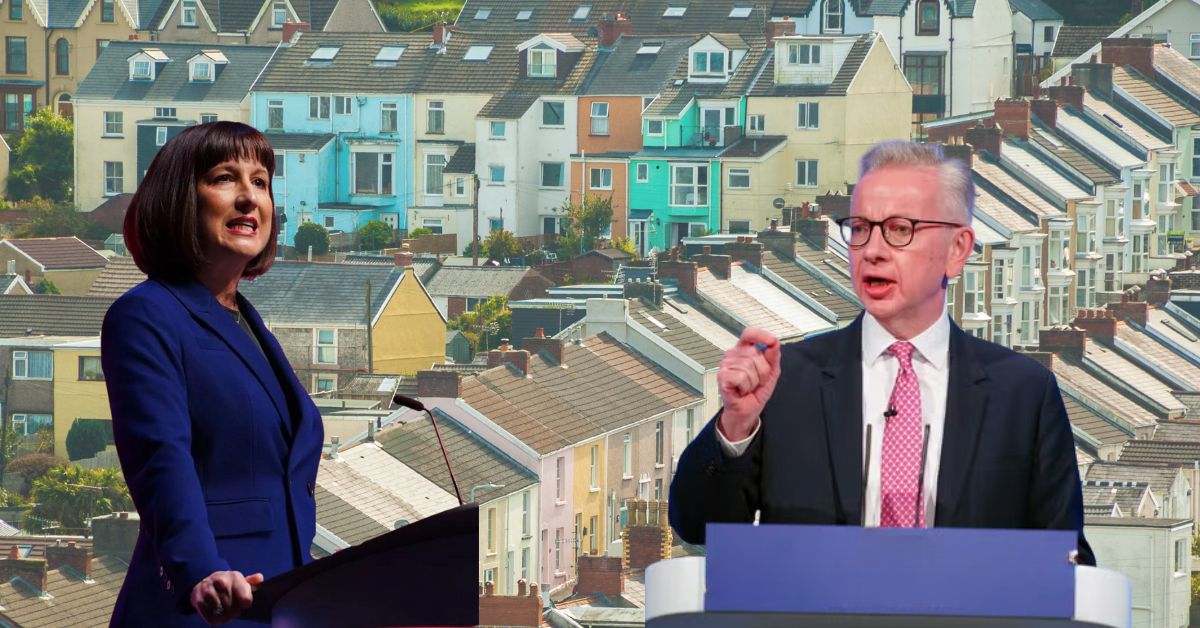
EUUK
3 July 2025
October 19, 2023
Party conference season has come to an end, and the housing crisis looks set to be a key battleground for the next election. We delve into the key takeaways from political parties’ housing policy announcements, and how they stack up against the bold new approach we need to move beyond the ‘property owning democracy’ and make homes affordable, secure and sustainable:
‘Homes Not Assets’ is put on the agenda
Housing was front and centre at the Labour Party Conference. It featured heavily in multiple keynote speeches, including during a packed-out keynote speech from Shadow Chancellor Rachel Reeves in which she declared that ‘a house should be a home not an asset’.
This is a strong statement, and a win for the host of tenants unions and civil society organisations that have been campaigning to end the pervasive and damaging culture of treating homes as an investment opportunity rather than as the foundation for a healthy society. And a commitment to viewing safe and healthy homes as a right, rather than as a vehicle for speculation and rent extraction, is a critical bedrock for any policy platform that wants to address the underlying drivers of our housing crisis. But behind Labour’s grand rhetoric, there remains little substance for tenants and those at the sharp end of the housing crisis. Affordable homes for renters are increasingly out of reach. Rental prices across the UK have risen significantly since 2021, growing at their fastest yearly rate in almost a decade in August 2023 at 5.5%.
One welcome announcement came in the form of Labour’s pledge to increase the stamp duty surcharge for foreign purchasers, which could help to disincentivise speculative overseas investment in UK property. However, despite Reeves’ recognition that many property investors ‘leave homes empty, driving up prices’, a surcharge on only a subset of these is timid in the context of almost two-decades of uninterrupted growth in house prices (even considering the recent fall in prices driven by the Bank of England’s interest rate rises).
It’s true that the number of empty homes is increasing at pace. But if political parties really want to disincentivise investment in homes by people who won’t live in them, they should introduce fairer taxes on property to make speculation less attractive. New York City, for instance, in recognising how investment in properties for short-term lets has been pivotal in driving up house price inflation, has recently introduced regulations that amount to a de-facto ban on Airbnb. The Scottish Government, in the run-up to the SNP conference, have also announced that they will empower local councils to double council tax on second homes to support the redistribution of existing homes to those who need them.
Addressing the financialisation of homes didn’t quite make it onto the agenda of the conservative conference, however. Whilst Michael Gove, current Secretary of State for Levelling up, Housing and Communities declared the intention ‘that every family has a safe, decent warm home’, this formed part of only a brief reference to housing at the Conservative Party Conference. Indeed, there was no mention of the housing crisis in the Prime Minister or Chancellor’s speech, and incumbent Housing Minister Rachel Maclean even felt the need to reassure an audience of majority landlords that private renters do indeed deserve at least some rights.
At Bright Blue event about the proposed regulation of landlords. Housing minister @redditchrachel says that her children all rent their homes and vote conservative – not all private renters “smoke weed” or are “bad people in gangs” she says. Conservatives rent their homes too…. pic.twitter.com/XQTSwVPKer
— Vicky Spratt (@Victoria_Spratt) October 2, 2023
We need bolder action to fix the UK’s housing crisis
By far the dominant solution proposed to the housing crisis at all Parties’ Conferences was to increase housing supply: what to do to get Britain building?
The narrative that building new housing at scale will be the silver bullet that fixes the housing crisis isn’t new. The Conservatives 2019 manifesto promised to build 300,000 homes a year, and of the few comments made on housing by Michael Gove, top priority was affirming that the current government is on track to build 1 million homes in this parliament. Labour’s ‘build, build, build’ rhetoric was accompanied by a target for 1.5 million new homes within 5 years, equalling the current government’s goal. And despite Liberal Democrat leaders being set to scrap the party’s existing target of 380,000 new homes per year, young members forced that it be retained.
Details of how different parties would deliver on house building promises remains to be seen. But setting practicalities aside, it’s clear that the misleading portrayal of the housing crisis as primarily due to a supply shortage hasn’t gone away. Despite evidence that British building stock continues to grow faster than the population, and that the number of empty homes is increasing, the main political parties are still not addressing the ‘house-price inflation’ shaped elephant in the room.
Building new housing, but who for?
Whilst a blunt focus on new building alone won’t be sufficient to address today’s housing crisis, and could even jeopardise climate and environmental goals, we do urgently need more social and truly affordable housing. But to date, all parties have yet to propose a strategy for social housing that meets the scale of the challenge and prioritises providing good, green, and truly affordable homes for those who need them.
The Conservatives have yet to address our declining social housing stock, which fell by over 14,000 last year alone, leaving more and more people at the mercy of the insecure and unaffordable private rental sector. And despite Labour’s ambitious pledge to ‘deliver the biggest boost in affordable and social housing for a generation’, they have yet to set a target as to how much social housing they would aim to provide. Labour have proposed to allow local governments to use more of the existing funding they receive from the affordable homes programme to buy existing stock to rent out as social homes – acquisitions are currently limited to only 10%, the remainder of which must be used for new building. This proposal echoes calls for community Right to Buy schemes, an intervention which – if delivered at scale with sufficient public funding – could provide the social housing we urgently need whilst reducing the environmental impact of new developments. Concerningly, the Liberal Democrats would aim to meet their target of 150,000 new social homes through new building alone.
Missing from both, however, are the all important details of how the expansion of social housing would be funded – details that have important implications for our housing system. The past decade has seen a huge increase in private investment in for-profit social housing providers, with around 70% of investment for new homes now sourced from private financing. But do we want our social housing to be a vehicle for profit extraction by global investment funds?
Campaigners keep the pressure on for a better deal for renters
Conference season saw some recognition from politicians of soaring rents, which have now reached a record high. But the overwhelming focus remained on ‘getting people on the housing ladder’, rather than creating the conditions for renting to be a safe, secure and affordable alternative to homeownership. Sadly, few promises were made for better rights and protections for private renters. Crucially absent were any policies to stabilise rents, or shift the balance of power away from landlords’ who are still raising rents after benefiting from two decades of rental properties increasing in value by a whopping 432% in England between 1990 – 2022 (143% if adjusted for inflation). And the Government has yet to deliver the Renters Reform Bill that would ban ‘No Fault’ Section 21 evictions even though it was promised in the Conservative’s 2019 Manifesto, reportedly due to internal pressure from Conservative MPs who are also landlords.
Labour have promised rental reforms if they come to power and hinted at the need for more comprehensive reforms, but have stopped short of committing to enforce fairer rental conditions, such as empowering local authorities to introduce rent controls – a policy backed by Greater Manchester Mayor Andy Burnham and the Green Party.
What’s missing? A bold approach to making homes truly affordable and move us beyond the ‘property owning democracy’
It’s promising to see housing affordability rise up the political agenda, but proposals from all major parties at this year’s conference season fell desperately short. To deliver genuinely affordable housing and stop the boom-and-bust cycle of our housing market, we need bold action. And we must counter the lingering notion of the UK as a ‘property owning democracy’, that is clouding our ability to see homes as somewhere for people to live, rather than vehicles to generate income and wealth.
You can read more about Positive Money’s proposals to build a fairer housing system based on need not profit here. And if you haven’t yet, sign-up to our mailing list for more regular updates about our work to enable a fair, sustainable and democratic economy here.
